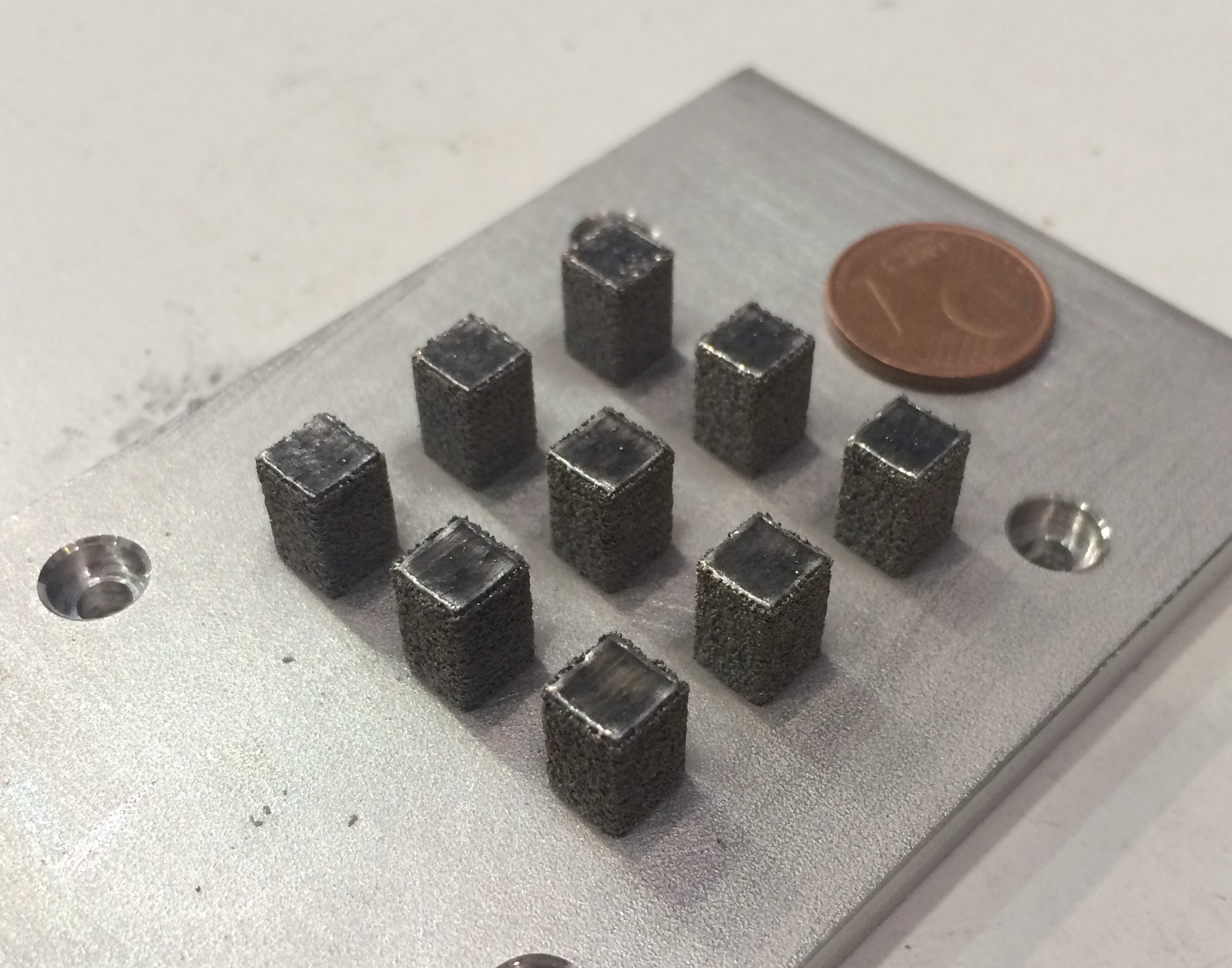 The aim of the project is to draw the next frontiers of cold spray (CS), a new, solid-state coating deposition technology. At first, the process and its advantages and disadvantages have been assessed. Then, current equipment, materials and applications have been studied, in order to outline present technological limits from the study of recent innovations in the field. Subsequently, cold spray technical, environmental and economic impact in comparison with competing processes (thermal coatings, additive manufacturing technologies) have been analysed. At this point, the explorative phase of the project began, and new innovative applications, promising materials systems and technological improvements have been investigated and selected. Indeed, the project focused on developing four high-potential applications in four different fields, and on assessing both their technical and economical feasibility. First of all, three different demonstrators produced with CS technology were developed in biomedical, additive manufacturing (AM) and materials fields respectively. Regarding the biomedical demonstrator, properties of titanium-silver-hydroxyapatite (Ti-Ag-HA) coatings have been studied in order to be deposited on a tibial prosthesis, aiming at both reducing post-surgery infection probability and increasing cellular adhesion to the implant. For what concerns additive manufacturing, CS potentialities have been assessed by comparing CS sprayed specimens with samples produced with Selective Laser Melting (SLM) technology. Regarding the materials field, a thick coating of amorphous metal has been deposited. Finally, the fourth application consisted in optimizing nozzle geometry to increase CS deposition efficiency. This has been achieved through the creation of a model able to describe and simulate the flow throughout the nozzle, thus enabling the design of a new nozzle. In conclusion, technical performance assessment of CS, compared to other thermal and additive technologies, has been accomplished, in addition to economical feasibility study focused on the biomedical and additive manufacturing applications. A final critical assessment of CS opportunities evidenced how CS impacts the entire value chain and compared the results with present processes.
The aim of the project is to draw the next frontiers of cold spray (CS), a new, solid-state coating deposition technology. At first, the process and its advantages and disadvantages have been assessed. Then, current equipment, materials and applications have been studied, in order to outline present technological limits from the study of recent innovations in the field. Subsequently, cold spray technical, environmental and economic impact in comparison with competing processes (thermal coatings, additive manufacturing technologies) have been analysed. At this point, the explorative phase of the project began, and new innovative applications, promising materials systems and technological improvements have been investigated and selected. Indeed, the project focused on developing four high-potential applications in four different fields, and on assessing both their technical and economical feasibility. First of all, three different demonstrators produced with CS technology were developed in biomedical, additive manufacturing (AM) and materials fields respectively. Regarding the biomedical demonstrator, properties of titanium-silver-hydroxyapatite (Ti-Ag-HA) coatings have been studied in order to be deposited on a tibial prosthesis, aiming at both reducing post-surgery infection probability and increasing cellular adhesion to the implant. For what concerns additive manufacturing, CS potentialities have been assessed by comparing CS sprayed specimens with samples produced with Selective Laser Melting (SLM) technology. Regarding the materials field, a thick coating of amorphous metal has been deposited. Finally, the fourth application consisted in optimizing nozzle geometry to increase CS deposition efficiency. This has been achieved through the creation of a model able to describe and simulate the flow throughout the nozzle, thus enabling the design of a new nozzle. In conclusion, technical performance assessment of CS, compared to other thermal and additive technologies, has been accomplished, in addition to economical feasibility study focused on the biomedical and additive manufacturing applications. A final critical assessment of CS opportunities evidenced how CS impacts the entire value chain and compared the results with present processes.
Principal Academic Tutor
Mario Guagliano, Department of Mechanical Engineering, Politecnico di Milano
Academic Tutors
Monica Ferraris, Department of Applied Science and Technology, Politecnico di Torino
Alberto Guardone, Department of Aerospace Engineering, Politecnico di Milano
Barbara Previtali, Department of Mechanical Engineering, Politecnico di Milano
Chiara Vitale Brovarone, Department of Applied Science and Technology, Politecnico di Torino
Sara Bagherifard, Department of Mechanical Engineering, Politecnico di Milano
External institutions
Impact Innovation GmbH (Haun, D)
Helmut Schmidt University (Hamburg, D)
Technical University of Brno (Brno, CZ)
Centre de Projecció Térmica (CPT) – Universitat de Barcelona (Barcelona,E)
University of Nottingham (Nottingham, UK)
External Tutors
Peter Ricther, Sr. , Impact Innovations GmbH
Professor Frank Gaertner, Helmut Schmidt University
Jan Cizek, Technical University of Brno
Josep Maria Guilemany, Centre de Protecció Térmica (CPT) – Universitat de Barcelona
Tanvir Hussain, University of Nottingham
Team members
Paolo Caputo, Space Engineering, Politecnico di Milano
Gaetano D’Elia, Mechanical Engineering, Politecnico di Torino
Martina Genta, Biomedical Engineering, Politecnico di Torino
Mehdi Hadi, Mechanical Engineering, Politecnico di Torino
Fabio Pino, Space Engineering, Politecnico di Torino
Gianluca Roscioli [Team Controller and Communication Coordinator], Material and Nanotechnology Engineering, Politecnico di Milano
Maria Vittoria Zuccoli, Mechanical Engineering, Politecnico di Milano
